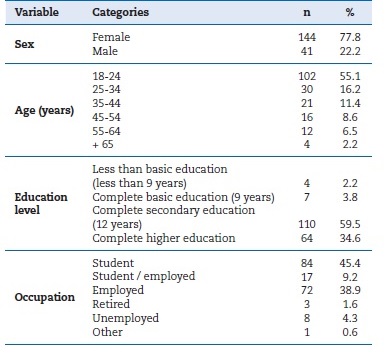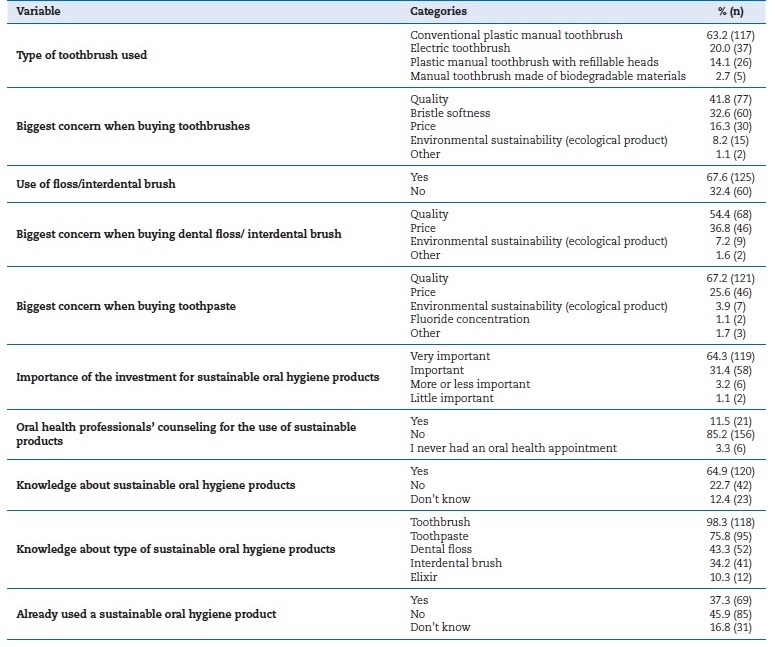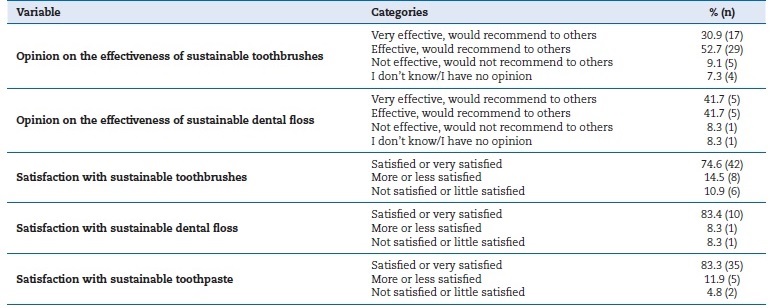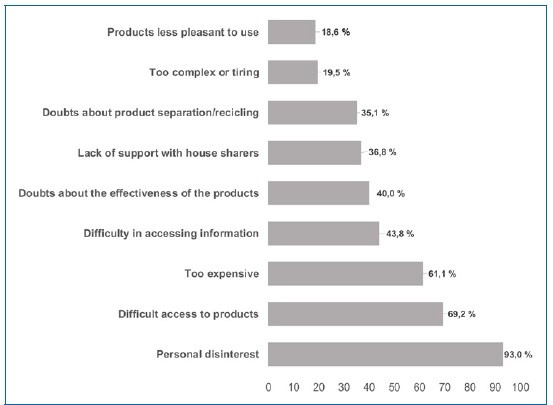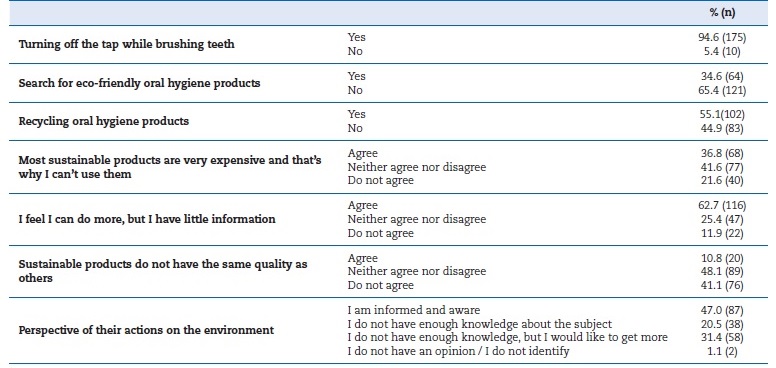Introduction
One of the most significant challenges of the 21st century is the global warming caused by climate change.1,2 With this concern in mind, in 2015, the United Nations proposed na agenda for sustainable development by 2030 to increase environmental, social, and economic efforts for an improvement in the population´s quality of life.3 In 2017, the World Health Organization European Region members adopted sustainable development measures in the area of health.4
Since oral health is a part of human life and health, incorporating sustainable development goals is essential in making changes for sustainable dentistry.5,6 Oral health professionals should be aware of their role in promoting sustainability in clinical practice, office management, counseling, and patient health promotion.7,8 They can be a vehicle for changing behavior and promoting good oral health with ecological and sustainable practices.9,10 Effectively, oral disease prevention allows for a decrease in their economic and environmental impact, reducing traveling by patients and the number of clinical appointments and minimizing the amount of waste produced and recycled.1,5,10 However, this is hindered by the need for more information and motivation and the wrong perception that sustainable alternatives represent an additional cost.8,11-13
Oral hygiene products are mostly made of plastic, contributing to one of the world’s major problems today: plastic pollution. Fortunately, alternative ecological products are emerging to promote sustainable oral health care. The World Dental Federation (FDI) launched a new project, “Sustainability in Dentistry,” with commercial and high-education partners, intended to achieve sustainable purchasing and supply procedures.14 Through this and other initiatives, a wide variety of sustainable oral hygiene products have arisen on the market and can be found in commercial companies, online stores, and “zero-waste” associations.12,15 Examples of this type of product are toothbrushes with bamboo or sugar-cane handles; dental floss with recyclable packaging and made from biodegradable materials, such as bamboo, starch, charcoal, or beeswax; and toothpaste with packaging made from biodegradable, recycled, and recyclable materials, such as glass, paper, or cardboard, also facilitating the product separation and recycling process.
A study in Ireland highlighted characteristics of a manual toothbrush that were considered important influencers of the consumer’s choice, namely the sustainable disposal of products and packaging and the texture of the bristles.16 Another study carried out in the United Kingdom found that participants reported positive attitudes toward more sustainable dentistry and that they were willing to compromise their time, the convenience and durability of their dental treatment, as well as paying more, to reduce the impact of dental treatments on the environment.17 The results of these studies demonstrate the growing concern for sustainability by the populations, including a greater concern related to oral health selfcare and treatment.
To promote the use of more sustainable products, it is importante to know the factors consumers consider when buying oral hygiene products, as well as their perceptions and opinions regarding using more eco-friendly products. Thus, intending to contribute to the knowledge of sustainability related to oral health, this study aims to know the consumer’s perspective, expectations, and barriers regarding the use of sustainable oral hygiene procedures and products.
Material and Methods
The Faculty of Dentistry of the University of Lisbon’s Ethics Committee approved this cross-sectional study. Data was collected through an online questionnaire self-completed by the participants. The questionnaire was available through a link that was disseminated to the general population via social media (Facebook and Instagram) between March and April 2022.
The target population consisted of individuals 18 years old or older residing in Portugal. All individuals who voluntarily agreed to participate and responded to the questionnaire were included.
The anonymous questionnaire was developed specifically for the study based on a literature review.3,12-14 Before its application, it was reviewed by a panel of three experts and subsequently subjected to a pre-test. The objectives and procedures of the study were presented on the first page. The first question confirmed the agreement to participate in the study (informed consent), and only those who consented had access to the questionnaire. The inclusion criteria were also confirmed at the beginning of the questionnaire. The questionnaire collected information about demographic characterization, the use of general oral hygiene products, the use of sustainable oral hygiene products (practices, perceptions, opinions, and experienced barriers), and sustainable lifestyle practices.
Descriptive analysis was performed, calculating all variables’ absolute and relative frequencies.
Results
The sample included 185 individuals. Most of the participants were female (77.8%), with ages between 18-24 years old (55.1%), and secondary education (59.5%) (Table 1). The most frequently used toothbrushes for oral hygiene were conventional manual plastic brushes (63.2%), followed by electric toothbrushes (20.0%). When asked about the main concern regarding the purchase of toothbrushes, the quality of the brush (41.8%) and the softness of the bristles (32.6%) were most frequently mentioned, while only 8.2% mentioned environmental sustainability as a priority for the selection of these products. Regarding dental floss or interdental brush, 67.6% of the participants mentioned using them. When buying these products, there was a significant concern with the quality (54.4%) and the price (36.8%). Similarly, quality (67.2%) and price (25.6%) were mentioned as the primary concerns when buying toothpaste, with only 3.9% stating environmental concerns (Table 2).
About 64% of the participants considered that it is essential to invest in the development of sustainable oral hygiene products. The vast majority (85.2%) indicated they had never received advice from oral health professionals for using these products. Although 64.9% reported knowing sustainable oral hygiene products, only 37.3% mentioned using them. The sustainable oral hygiene products most frequently known by the participants were toothbrushes (98.3%) and toothpaste (75.8%) (Table 2).
Considering the individuals who already used sustainable oral hygiene products, 79.7% stated they had already used a sustainable toothbrush, namely, one with bamboo handles (85%), biodegradable plastic handles (43.6%), or sugar-cane handles (10.9%). Regarding sustainable dental floss, 17.4% of the participants reported already using it. Sustainable toothpaste was reported by 60.9% of the participants, namely, one with packaging with biodegradable plastic (76.2%) and paper (35.7%).
Table 3 presents the participants’ perceptions of the effectiveness of sustainable oral hygiene products. Most participants who had used these products said that the sustainable toothbrushes and dental floss were “effective” or “very effective” and would recommend these products to others. Most participants felt “satisfied” or “very satisfied” using sustainable dental products.
The most frequently referred barriers to implementing sustainable oral hygiene were personal disinterest (93.0%), the difficulty in accessing products (69.2%), the high price of products (61.1%), and the difficulty in accessing information about this topic (43.8%) (Figure 1). Regarding sustainable practices implemented in their daily routine, about 94.6% of the participants indicated they had the habit of turning off the tap while brushing their teeth, 55.1% reported recycling used oral hygiene products, and 34.6% said they were looking for more “environmentally friendly” oral hygiene products (Table 4).
About 47% perceived that their individual actions have environmental consequences, and 20.5% answered that they did not know enough about the subject. About 31% of the participants revealed wanting to learn more about the topic (Table 4).
Discussion
The 2030 Agenda established 17 sustainable development goals (SDGs) and 164 targets to be achieved by the year 2030, including goals and targets for good health and well-being (SDG 3) and for responsible consumption and production (SDG 12). The health-related objectives intend to promote the adoption of sustainable practices in all areas of health and ensure people’s well-being and quality of life. Regarding responsible consumption and production, the objectives intend to reduce the use of natural resources, waste production, and air and water pollution.4 Preventing oral health diseases and counseling the patients for correct oral self-care with more sustainable products can be included in the clinical routine practices of oral health professionals, contributing to achieving these SDGs.
Globally, there is a growing concern about using environmentally friendly products, and companies are increasing the development of this type of product. However, there are still several challenges, namely, increasing the awareness for adopting more sustainable practices and promoting the production of more ecological products. Sustainable products require renewable and recyclable materials and waste treatment that can make them more expensive; consequently, not all consumers can or want to pay for them.18 In recent years, the availability of ecological and sustainable oral healthcare products has increased. Using this type of product can lead to more sustainable oral hygiene practices, which, when included in the daily routine, can positively impact the environment. To promote the use of this type of product, consumers must be informed and involved, reinforcing that each individual’s sustainable behaviors are essential.
Indeed, a lack of knowledge and environmental awareness can reduce the effectiveness of more environmentally friendly actions.19
The results of the present study demonstrated that the participants are aware of the theme of sustainability, with the majority considering the development of sustainable products important. However, only a third of the individuals reported having tried this type of product, and a minority considered sustainability aspects when choosing oral hygiene products.
Thus, there is an interest and knowledge about these products, but not an actual implementation of their use in a constant and sustained way. A study in Ireland found that consumers considered the sustainable disposal of products and packaging and the texture of the bristles to be the most important characteristics when choosing toothbrushes, stating they would consider paying around 6 euros extra to buy a more sustainable product.16
Other studies carried out on specific populations of oral health professionals have shown they were aware of the commitment to environmental sustainability but felt that transforming this awareness into action was a great challenge.
Some barriers identified included limited knowledge, the availability of sustainable products,8,20 and meeting the requirements of current performance standards, costs, and infection control guidelines.20 Effectively, to support changes and increase the use of sustainable products, patient counseling by oral health professionals may be crucial in promoting awareness of environmental problems. The involvement and training of oral health professionals are essential, so introducing this theme should be considered in the pre-graduate curriculum of oral health courses.21 Educational institutions, including higher education institutions, must play an active role in promoting knowledge and skills related to sustainability, encouraging future professionals and citizens to be better prepared for the challenges of climate change, and contributing to a “quality education” (SDG 2).
On the other hand, for health professionals to have more confidence in advising sustainable products, they must have knowledge and confidence in the quality of the products, their safety, and their effectiveness in preventing oral pathologies. So, it is necessary to promote quality research for better information on products’ effectiveness and carbon footprint.
Some recent studies have compared some oral hygiene materials for sustainability,22-24 but more is needed to promote confidence among healthcare professionals and consumers. Additionally, companies must provide more detailed information on the type and origin of sustainable materials and how they are manufactured to facilitate the product’s recommendation by oral health professionals. Some authors advocate an approach similar to food products and their labeling, suggesting that the packaging of oral hygiene products should follow an appropriate standardized methodology and that an overall assessment of their environmental impact should be included on the packaging of these products to guide an informed decision by consumers and oral health professionals.25
Most participants who had already used sustainable oral hygiene products were satisfied, considering them effective and recommending their use. However, they indicated difficulties such as lack of interest, product availability, price, and doubts about efficacy and safety, which may condition their use. So, there is a high level of intention to purchase sustainable products and satisfaction with their effect. However, these are not directly reflected in the routine practice of their use and consumption. Despite the barriers, the sustained use of these products is only more effective in individuals who are more attentive and aware of adopting sustainable practices.26 As sustainable products tend to be more expensive than conventional products, consumers directly compare the ecology of sustainable products with cost-effectiveness. Consumers already predisposed to using ecological products are usually more receptive to paying more for these products.19,26 However, a study in Brazil about the consumption of sustainable products -not directly related to oral health- identified information and knowledge, environmental attitude, social context, and environmental awareness as factors that strongly influenced the consumption of sustainable products. This study also showed that quality and price were less influential in consumer decision-making.27
Some factors that lead Portuguese consumers to adopt sustainable behaviors are social influence, feelings, and cognition.
Social influence is crucial in ensuring both the adoption of sustainable practices and the intention of sustainable purchases. It means that individuals are more receptive to adopting behaviors practiced in their community or that seem more socially accepted. In addition, personal norms and values also constitute a determining and decisive factor in the adoption/change of behaviors.28 Consumers who already adopt other sustainable practices in their daily lives will be more predisposed to buying sustainable products, as a growing awareness and inclination toward sustainable consumption influences their purchasing decisions.28,29
Another important aspect is that sustainable products must meet consumer expectations, so their marketing must be consistent and reliable to avoid the consumers’ disbelief. It is also crucial for companies to guarantee the quality of their products, which is fundamental to increasing satisfaction and confidence in sustainable products.18 In the present study, quality was the most frequently highlighted aspect of choosing oral hygiene products.
Oral health care is a fundamental requirement for good oral and general health, significantly impacting quality of life, self-esteem, and social relationships. Combining proper oral hygiene with sustainable practices promotes a healthy lifestyle in a healthy environment. It is impossible to ignore the impact that consumption and our practices have on future generations, so this alliance of oral health prevention to ecological behaviors and practices is crucial to this collective and integrated thinking. Oral health professionals must be informed about this subject and be able to make simple recommendations to reduce the human ecological footprint, such as encouraging the closing of the water tap when brushing teeth, recycling used hygiene products, or using more environmentally friendly products that are adequate to the patient’s condition.
This study aims to contribute to the knowledge of the use of sustainable oral hygiene products and habits, offering na exploratory insight into the perceptions and expectations of consumers living in Portugal. This cross-sectional study included a non-probabilistic sample, with data collected by na online questionnaire. This methodology has some advantages but also several caveats. The latter ones are related to the sample and include the possibility of self-selection, non-response, unknown participation rates, and under-coverage of the target population, determined, among others, by access to the internet.30 Despite these limitations, the present study aimed to contribute to the theme of sustainability related to oral health, which still needs further investigation. The extrapolation of the results is not possible, considering the limitations already mentioned. Future studies using representative samples would be important.
Conclusions
The participants considered it essential to acquire sustainable habits related to oral hygiene, but only a minority had used sustainable oral hygiene products. The main concerns when buying oral hygiene products were their quality or cost, and sustainability was not a frequent concern. Most individuals who already used sustainable oral hygiene products were satisfied and would recommend them. The main barriers to using sustainable oral hygiene products were the personal lack of interest, the availability of the products, and their cost.














